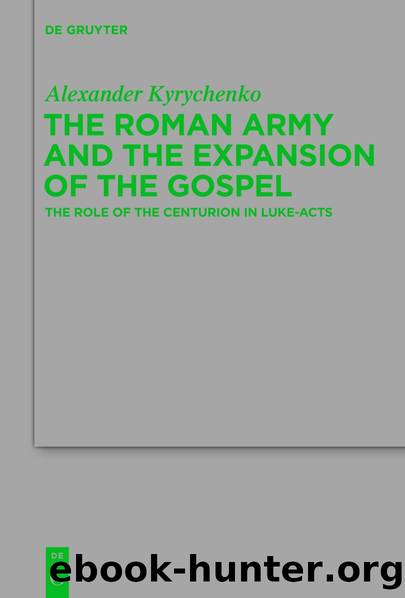The Roman Army and the Expansion of the Gospel by Alexander Kyrychenko

Author:Alexander Kyrychenko [Kyrychenko, Alexander]
Language: eng
Format: epub
Publisher: De Gruyter
Published: 2014-07-16T00:00:00+00:00
5.5 Conclusion
The above exposition reveals that Lukeâs presentation of Roman army personnel appears in a distinctively positive light in comparison with other New Testament writings and, as will be pointed out in the Conclusion, with the Greco-Roman and Jewish sources. Even when Luke relates the events that implicate the Roman army as deadly force, such as the destruction of Jerusalem and the temple, or the crucifixion of Jesus, he avoids presenting the army in a negative light. Luke modifies the Passion Narrative to tone down the involvement of the Roman troops in the trial and crucifixion of Jesus, transferring all the blame for Jesusâs death on the Jewish people and their leaders. In his predictions of the destruction of Jerusalem and the temple, Luke exploits this notion of the Jewish peopleâs guilt in their rejection of Godâs Messiah. Surpassing the other Gospels in the number and the clarity of the prophetic allusions to the Roman army, Luke underscores the armyâs role as the divine agent of punishment for that sin.
The portrayal of the Roman army as the instrument of the divine will is also seen in the accounts describing the interaction between Paul and the Roman troops. The accounts of the Roman soldiers saving Paul from lynching in the temple by the Jewish mob, protecting him from the assassination plot of the Jewish radicals, transferring him to Caesarea and then further to Rome demonstrate that in the narrative of Acts, the Roman troops continuously facilitate the progressive development of the divine plan of expanding the Gentile mission to the imperial capital. In this chain of events, the centurion Julius stands out as he puts his life at risk in order to save Paulâs. The entire account of Paulâs sea voyage from Caesarea to Rome plays out the symbiotic relationship between the divine messenger and the Roman centurion that results in everyoneâs deliverance from peril and the fulfillment of the divine intent.
As Luke shows through Peterâs sermon in the house of the centurion Cornelius, the key stages of the gospel story include the ministry of John the Baptist, the healing activity of Jesus, and his crucifixion. Remarkably, the Roman military figures in Luke-Acts exemplify the proper response to the gospel at each of these stages. The soldiers, found exclusively in Lukeâs account, are present at Johnâs baptism and accept his message of repentance in wake of the Jesusâs ministry. The centurion of Luke 7 recognizes Jesus as Godâs emissary who possesses divine authority and the power to heal at will, demonstrating a level of faith not found in Israel. The centurion at the cross makes a declaration unique to Lukeâs account, delivering the final verdict on Jesusâs innocence. In the second meaning of the proclamation, the centurion affirms Jesus as the righteous one. Thus in the Gospel of Luke, soldiers and centurions exemplify outsiders to Judaism who acknowledge what the unbelieving Jews refuse to accept. Thereby Luke prepares the reader for focusing on the Gentile mission in the final portion of Luke-Acts.
Download
This site does not store any files on its server. We only index and link to content provided by other sites. Please contact the content providers to delete copyright contents if any and email us, we'll remove relevant links or contents immediately.
Machine Learning at Scale with H2O by Gregory Keys | David Whiting(4289)
Never by Ken Follett(3930)
Fairy Tale by Stephen King(3365)
Reminders of Him: A Novel by Colleen Hoover(3070)
The Man Who Died Twice by Richard Osman(3060)
Will by Will Smith(2903)
Rationality by Steven Pinker(2348)
It Starts With Us (It Ends with Us #2) by Colleen Hoover(2327)
Can't Hurt Me: Master Your Mind and Defy the Odds - Clean Edition by David Goggins(2319)
Friends, Lovers, and the Big Terrible Thing by Matthew Perry(2211)
The Becoming by Nora Roberts(2184)
The Stranger in the Lifeboat by Mitch Albom(2110)
Love on the Brain by Ali Hazelwood(2055)
New Morning Mercies: A Daily Gospel Devotional by Paul David Tripp(1906)
The Strength In Our Scars by Bianca Sparacino(1834)
A Short History of War by Jeremy Black(1833)
HBR's 10 Must Reads 2022 by Harvard Business Review(1832)
A Game of Thrones (The Illustrated Edition) by George R. R. Martin(1707)
Never Finished: Unshackle Your Mind and Win the War Within by David Goggins(1694)
